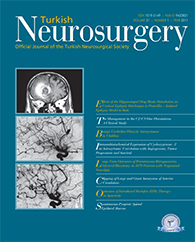2Karaman State Hospital, Department of Neurosurgery, Karaman, Turkey DOI : 10.5137/1019-5149.JTN.3231-10.1 AIM: CSF shunt failure is still a frequent problem in children. This prospective study was designed for focusing symptoms and reasons of shunt failure. We also especially focused on the mechanical reasons of shunt failure.
MATERIAL and METHODS: We focused on the causes of shunt failures, and the symptoms and signs in patients who were operated for shunt malfunction between January 1, 2001 and December 31, 2005 in the neurosurgery department. All examination and operative data were collected prospectively. Evaluation of these data was with the chi-square and Fisher exact tests.
RESULTS: After the evaluation of data on 111 patients and 153 revision procedures, the major symptoms in this group were vomiting (62.16%), somnolence (59.45%) and headache (48.64%). In the majority of the shunt revisions (115 operations, 75.2% of the all 153 procedures), one or more mechanical problems of the shunt systems were identified in surgery.
CONCLUSION: Shunt failures in children sometimes appear with very unusual symptoms. Also, probable structural problems of the shunt systems seem very important for shunt failure according to patient characteristics and etiology of the hydrocephalus. A systematic approach including CT, shunt series and abdominal ultrasound is needed to rule out shunt malfunction.
Keywords : Hydrocephalus, Shunt systems, Symptom




